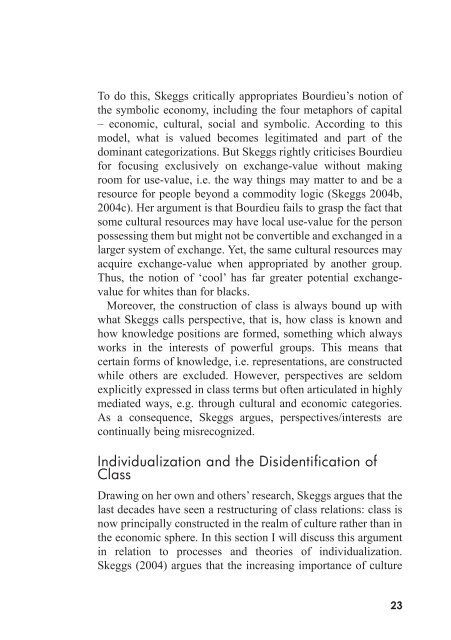Thinking with Bevereley Skeggs - Stockholms universitet
Thinking with Bevereley Skeggs - Stockholms universitet
Thinking with Bevereley Skeggs - Stockholms universitet
- No tags were found...
Create successful ePaper yourself
Turn your PDF publications into a flip-book with our unique Google optimized e-Paper software.
To do this, <strong>Skeggs</strong> critically appropriates Bourdieu’s notion ofthe symbolic economy, including the four metaphors of capital– economic, cultural, social and symbolic. According to thismodel, what is valued becomes legitimated and part of thedominant categorizations. But <strong>Skeggs</strong> rightly criticises Bourdieufor focusing exclusively on exchange-value <strong>with</strong>out makingroom for use-value, i.e. the way things may matter to and be aresource for people beyond a commodity logic (<strong>Skeggs</strong> 2004b,2004c). Her argument is that Bourdieu fails to grasp the fact thatsome cultural resources may have local use-value for the personpossessing them but might not be convertible and exchanged in alarger system of exchange. Yet, the same cultural resources mayacquire exchange-value when appropriated by another group.Thus, the notion of ‘cool’ has far greater potential exchangevaluefor whites than for blacks.Moreover, the construction of class is always bound up <strong>with</strong>what <strong>Skeggs</strong> calls perspective, that is, how class is known andhow knowledge positions are formed, something which alwaysworks in the interests of powerful groups. This means thatcertain forms of knowledge, i.e. representations, are constructedwhile others are excluded. However, perspectives are seldomexplicitly expressed in class terms but often articulated in highlymediated ways, e.g. through cultural and economic categories.As a consequence, <strong>Skeggs</strong> argues, perspectives/interests arecontinually being misrecognized.Individualization and the Disidentification ofClassDrawing on her own and others’ research, <strong>Skeggs</strong> argues that thelast decades have seen a restructuring of class relations: class isnow principally constructed in the realm of culture rather than inthe economic sphere. In this section I will discuss this argumentin relation to processes and theories of individualization.<strong>Skeggs</strong> (2004) argues that the increasing importance of culture23
















